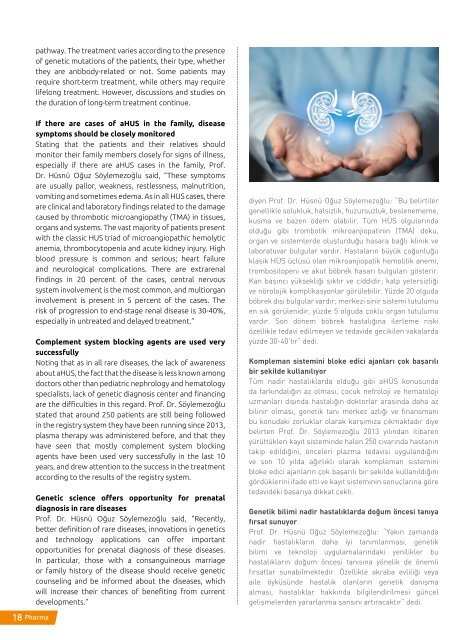Create successful ePaper yourself
Turn your PDF publications into a flip-book with our unique Google optimized e-Paper software.
pathway. The treatment varies according to the presence<br />
of genetic mutations of the patients, their type, whether<br />
they are antibody-related or not. Some patients may<br />
require short-term treatment, while others may require<br />
lifelong treatment. However, discussions and studies on<br />
the duration of long-term treatment continue.<br />
If there are cases of aHUS in the family, disease<br />
symptoms should be closely monitored<br />
Stating that the patients and their relatives should<br />
monitor their family members closely for signs of illness,<br />
especially if there are aHUS cases in the family, Prof.<br />
Dr. Hüsnü Oğuz Söylemezoğlu said, “These symptoms<br />
are usually pallor, weakness, restlessness, malnutrition,<br />
vomiting and sometimes edema. As in all HUS cases, there<br />
are clinical and laboratory findings related to the damage<br />
caused by thrombotic microangiopathy (TMA) in tissues,<br />
organs and systems. The vast majority of patients present<br />
with the classic HUS triad of microangiopathic hemolytic<br />
anemia, thrombocytopenia and acute kidney injury. High<br />
blood pressure is common and serious; heart failure<br />
and neurological complications. There are extrarenal<br />
findings in 20 percent of the cases, central nervous<br />
system involvement is the most common, and multiorgan<br />
involvement is present in 5 percent of the cases. The<br />
risk of progression to end-stage renal disease is 30-40%,<br />
especially in untreated and delayed treatment.”<br />
Complement system blocking agents are used very<br />
successfully<br />
Noting that as in all rare diseases, the lack of awareness<br />
about aHUS, the fact that the disease is less known among<br />
doctors other than pediatric nephrology and hematology<br />
specialists, lack of genetic diagnosis center and financing<br />
are the difficulties in this regard. Prof. Dr. Söylemezoğlu<br />
stated that around 250 patients are still being followed<br />
in the registry system they have been running since 2013,<br />
plasma therapy was administered before, and that they<br />
have seen that mostly complement system blocking<br />
agents have been used very successfully in the last 10<br />
years, and drew attention to the success in the treatment<br />
according to the results of the registry system.<br />
Genetic science offers opportunity for prenatal<br />
diagnosis in rare diseases<br />
Prof. Dr. Hüsnü Oğuz Söylemezoğlu said, “Recently,<br />
better definition of rare diseases, innovations in genetics<br />
and technology applications can offer important<br />
opportunities for prenatal diagnosis of these diseases.<br />
In particular, those with a consanguineous marriage<br />
or family history of the disease should receive genetic<br />
counseling and be informed about the diseases, which<br />
will increase their chances of benefiting from current<br />
developments.”<br />
diyen Prof. Dr. Hüsnü Oğuz Söylemezoğlu: “Bu belirtiler<br />
genellikle solukluk, halsizlik, huzursuzluk, beslenememe,<br />
kusma ve bazen ödem olabilir. Tüm HÜS olgularında<br />
olduğu gibi trombotik mikroanjiopatinin (TMA) doku,<br />
organ ve sistemlerde oluşturduğu hasara bağlı klinik ve<br />
laboratuvar bulgular vardır. Hastaların büyük çoğunluğu<br />
klasik HÜS üçlüsü olan mikroanjiopatik hemolitik anemi,<br />
trombositopeni ve akut böbrek hasarı bulguları gösterir.<br />
Kan basıncı yüksekliği sıktır ve ciddidir; kalp yetersizliği<br />
ve nörolojik komplikasyonlar görülebilir. Yüzde 20 olguda<br />
böbrek dışı bulgular vardır; merkezi sinir sistemi tutulumu<br />
en sık görülenidir, yüzde 5 olguda çoklu organ tutulumu<br />
vardır. Son dönem böbrek hastalığına ilerleme riski<br />
özellikle tedavi edilmeyen ve tedavide gecikilen vakalarda<br />
yüzde 30-40’tır” dedi.<br />
Kompleman sistemini bloke edici ajanları çok başarılı<br />
bir şekilde kullanılıyor<br />
Tüm nadir hastalıklarda olduğu gibi aHÜS konusunda<br />
da farkındalığın az olması, çocuk nefroloji ve hematoloji<br />
uzmanları dışında hastalığın doktorlar arasında daha az<br />
bilinir olması, genetik tanı merkez azlığı ve finansmanı<br />
bu konudaki zorluklar olarak karşımıza çıkmaktadır diye<br />
belirten Prof. Dr. Söylemezoğlu 2013 yılından itibaren<br />
yürüttükleri kayıt sisteminde halen 250 civarında hastanın<br />
takip edildiğini, önceleri plazma tedavisi uygulandığını<br />
ve son 10 yılda ağırlıklı olarak kompleman sistemini<br />
bloke edici ajanların çok başarılı bir şekilde kullanıldığını<br />
gördüklerini ifade etti ve kayıt sisteminin sonuçlarına göre<br />
tedavideki başarıya dikkat çekti.<br />
Genetik bilimi nadir hastalıklarda doğum öncesi tanıya<br />
fırsat sunuyor<br />
Prof. Dr. Hüsnü Oğuz Söylemezoğlu: “Yakın zamanda<br />
nadir hastalıkların daha iyi tanımlanması, genetik<br />
bilimi ve teknoloji uygulamalarındaki yenilikler bu<br />
hastalıkların doğum öncesi tanısına yönelik de önemli<br />
fırsatlar sunabilmektedir. Özellikle akraba evliliği veya<br />
aile öyküsünde hastalık olanların genetik danışma<br />
alması, hastalıklar hakkında bilgilendirilmesi güncel<br />
gelişmelerden yararlanma şansını artıracaktır” dedi.<br />
18 <strong>Pharma</strong>

















